ChelseaCommunityNews.com (CCNews) is an independent online newspaper providing news, arts, events, and opinion content to Manhattan’s Chelsea community and its adjacent areas. That free content is made possible by advertising revenue, grants, and voluntary reader donations. Click here to contribute to our GoFundMe campaign.
*******************************
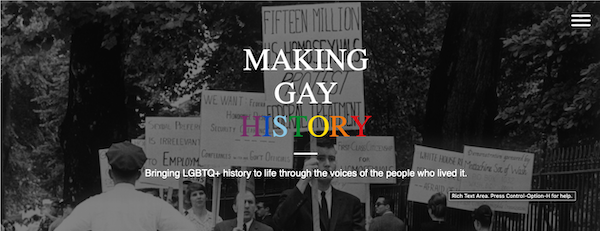
During June’s Pride Month, Chelsea Community Newsn(CCNews) is grateful–and appropriately proud–to note we’re being allowed to reprint content originally published as part of the much-honored, well-curated Making Gay History (MGH) project. Comprised primarily of 100+ podcast episodes telling the stories of LGBTQ+ trailblazers, MGH succeeds mightily in its mission to “address the absence of substantive, in-depth LGBTQ+-inclusive American history from the public discourse and the classroom” by providing “an entry point for both allies and the general public to its largely hidden history.”
What’s more, MGH’s local roots run deep: Its executive director, founder, and podcast host is longtime Chelsea resident Eric Marcus, who’s been recording oral histories from LGBTQ+ people since 1988. The former journalist used that material as the basis for his 1992’s book Making History as well as its 2002 revised edition (Making Gay History). In 2008, Marcus donated his cassette tape recordings to the New York Public Library with an agreement that they digitize the collection. Several years later, when asked by an organization that was developing LGBTQ-inclusive history lessons for short audio clips from his archive to anchor lessons about LGBTQ+ history, independent radio producer Sara Burningham (Marcus’ next door neighbor) came on board to edit the recordings and said she thought the material “sounded like a podcast.”
It did–resulting in the 2016 premiere of Making Gay History. Since then, notes Marcus, “its episodes have been downloaded six million times in more than 200 countries and territories around the world.” Last month, the New York Times named MGH as one of five “Compelling” oral history-based podcasts. For more information about the history of MGH, click here.
For CCNews’ debut installment in our series drawing from the MGH archives, we focus on another one-time resident of Chelsea–the late Bayard Rustin (1912-1987). To access the January 19, 2019 Rustin-themed podcast, click here. Note: The following text was written by Eric Marcus.
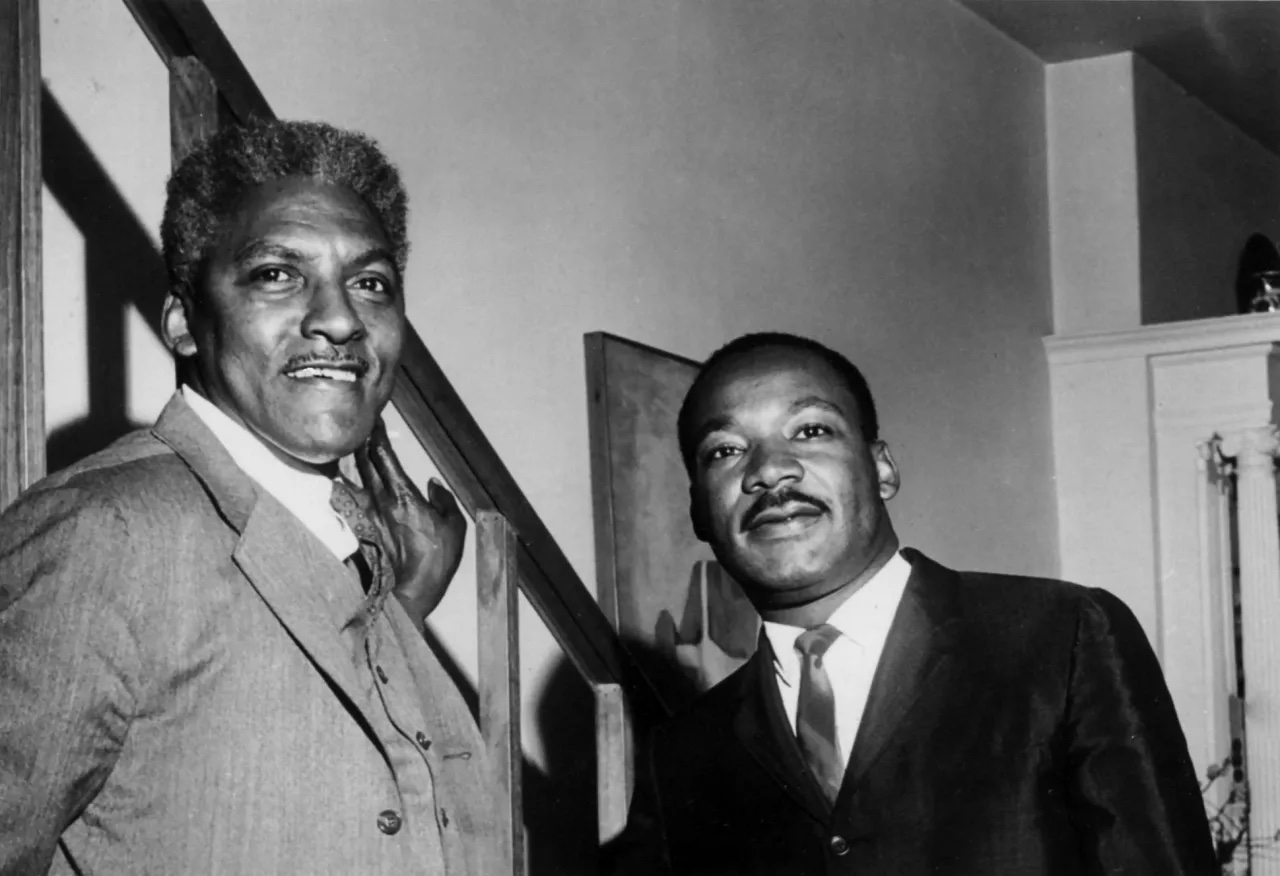
Bayard Rustin was a key behind-the-scenes leader of the Black civil rights movement—a proponent of nonviolent protest, a mentor to Dr. Martin Luther King, Jr., and the principal organizer of the landmark 1963 March on Washington for Jobs and Freedom.
And he was gay and open about it, which had everything to do with why he remained in the background and is little known today in comparison to other leaders of the civil rights movement. The FBI and Sen. Strom Thurmond tried to destroy him. But he persisted.
My earliest memory of anything having to do with the civil rights movement is indelible, because it’s one of the rare memories I have of my father, who died in 1970. He was lying on the sofa in the living room of our small apartment, watching Dr. Martin Luther King’s funeral on television following King’s assassination in April 1968. I was nine years old. While I have only the fuzziest memory of the black and white images on the TV screen, I will never forget the tears streaming down my father’s face. It was the first time I’d ever seen him cry.
My real introduction to the civil rights movement came in junior high school. My choir teacher, who was African American, led a concert every year in honor of Dr. King on King’s birthday and included in our rehearsals discussions about the history of the movement.
Bayard Rustin’s name never came up during those years and it wasn’t until I was an adult that I learned of Bayard Rustin’s critical role in the movement and the fact that he was gay. Rustin died a year before I started work on my oral history book, so I never had the chance to interview him.
As we began planning for the fourth season of the Making Gay History podcast, MGH’s executive producer, Sara Burningham, suggested we do an episode featuring Bayard Rustin. Rustin’s story, she explained, would give us the opportunity to explore a civil rights movement that so many of the people I’d interviewed for my book cited as a source of inspiration for their gay rights work—whether they participated directly in that movement, drew inspiration from it, or simply watched from a distance. And hearing Rustin’s story would provide insight into the crushing oppression and very real danger gay people faced during the pre-Stonewall era, especially someone who chose to be open about his sexuality while pursuing social justice work that put him in the public eye.
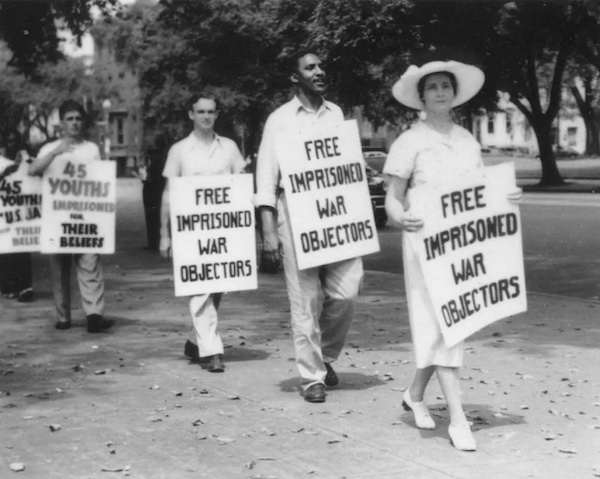
The challenge we faced in telling Rustin’s story in a Making Gay History episode was the apparent absence of any recordings where he talked about his experiences as a gay man. But thanks to the dogged researching efforts of Sara Burningham and the generosity of Rustin’s surviving partner, Walter Naegle, who recorded and saved the rare interviews Rustin gave on the subject of his sexuality, we’re able to bring this aspect of Rustin’s experience to life through his own voice.
After you’ve listened to this episode, look through the resources that follow below, watch the two documentaries we recommend, be prepared to be outraged by the prejudice Bayard Rustin endured–and be inspired by his persistence in the fight for equality and social justice.
To access the January 19, 2019 Rustin-themed podcast, click here.
AFTER LISTENING, RETURN HERE FOR MORE ABOUT BAYARD RUSTIN
Read Bayard Rustin’s 1987 New York Times obituary here. It identifies his partner Walter Naegle as his “administrative assistant and adopted son.” For a biography of Rustin, check out John d’Emilio’s Lost Prophet: The Life and Times of Bayard Rustin here. For young readers, there’s the biography Troublemaker for Justice: The Story of Bayard Rustin, the Man behind the March on Washington, written by Jacqueline Houtman, Michael G. Long, and Walter Naegle; you can find it here.
To read Rustin’s own words, explore Time on Two Crosses: The Collected Writings of Bayard Rustin here. Rustin’s papers reside at the Library of Congress.
Bayard Rustin, late 1940s. Credit: Photo courtesy of the Estate of Bayard Rustin.
Listen to this episode of the State of the Re:Union podcast to learn about Rustin’s indelible contributions to the civil rights movement. And find PBS’ award-winning POV documentary Brother Outsider: The Life of Bayard Rustin here. In 2013 Democracy Now! aired an episode devoted to Rustin. The show includes Rustin’s partner Walter Naegle, Rustin’s biographer John d’Emilio, and former chairman of the NAACP Julian Bond. Watch part 1 and part 2.
Read Senator Strom Thurmond’s August 13, 1963, denunciation of Rustin in the congressional record here, starting on page 14836. The New York Times reported on Rustin’s rebuttal here.
Rustin’s partner Walter Naegle was featured in a short film by Matt Wolf titled “Bayard and Me.” You can watch it here.
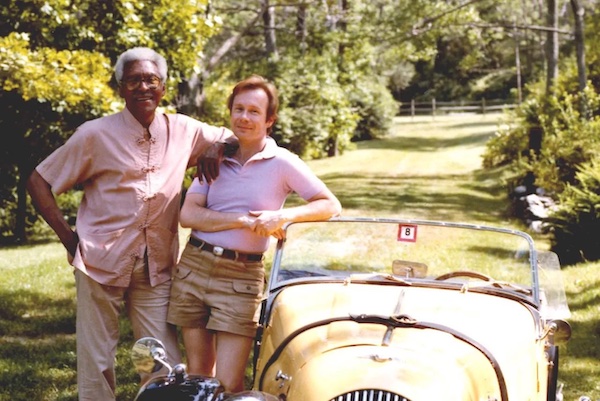
In her interview with Rustin, Peg Byron inquires about Rustin’s recent D.C. visit with Black and White Men Together. Learn more about the group here.
Watch President Obama honor Bayard Rustin at the 2013 Presidential Medal of Freedom ceremony. Watch Walter Naegle accept the medal here. Gay astronaut Sally Ride was honored alongside Rustin that same year; find out more about Ride here.
Bayard Rustin’s Presidential Medal of Freedom. Credit: Photo courtesy of Eric Marcus.
Eric Marcus’s interview with Walter Naegle was conducted at the home he shared with Rustin, which in 2016 was placed on the National Register of Historic Places. You can see the building on the website of the NYC LGBT Historic Sites Project here. The webpage has some great photos of Rustin, including one in his apartment with his extensive cane collection.
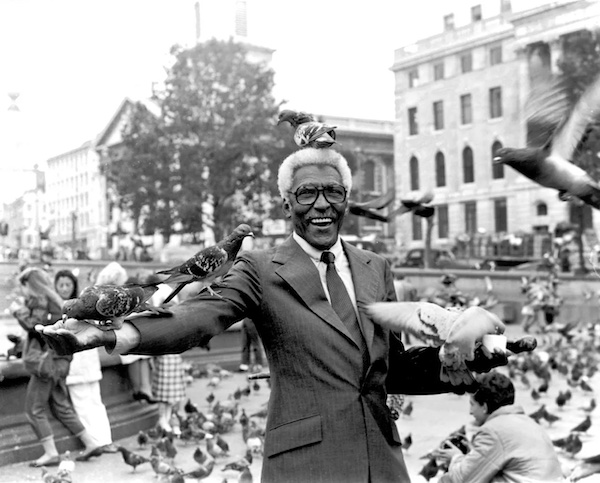
EXCERPT: Intro to the Bayard Rustin-themed MGH podcast:
Eric Marcus Narration: I’m Eric Marcus and this is Making Gay History!
In the 30 years since I started my work collecting oral histories of the LGBTQ civil rights movement, there’s one question I’m asked more than any other: Is there anyone you didn’t interview who you wish you’d talked to? There are a lot of people I wish I could have interviewed, but Bayard Rustin is near the top of that list. For a couple of reasons.
For many of the early gay rights activists I spoke with, their activism began with or was inspired by or influenced by the Black civil rights movement. And Bayard, who was gay and open about it, was one of the principal architects of that movement, having mentored Dr. Martin Luther King, Jr., and organized the landmark 1963 March on Washington for Jobs and Freedom. And he did so much more.
Bayard Rustin (right) and A. Philip Randolph on the cover of LIFE magazine, September 6, 1963, after the March on Washington for Jobs and Freedom. Credit: LIFE magazine.
But Bayard died a year before I began my work, so I couldn’t ask him how he navigated what I can only imagine was treacherous terrain for a Black gay man during those years, couldn’t ask him what impact his homosexuality had on his role in the Black civil rights movement, and I couldn’t ask what he thought about the fight for LGBTQ civil rights.
I never got the chance to record Bayard talking about all those things… But Walter Naegle did. Walter is Bayard’s surviving partner—as a matter of fact, Bayard had adopted Walter in 1982. Before marriage equality, adoption was one of the few ways for same-sex couples to protect each other’s legal rights.
During the 10 years they were together before Bayard’s death, Walter made backup recordings of many of the interviews Bayard gave. Including the never-before-heard interview we’re going to share with you in this episode.
Walter Naegle lives just a 10-minute walk north of where I live in Chelsea in New York City, in the same apartment he once shared with Bayard.
To access the January 19, 2019 Rustin-themed podcast, click here.
—END—
ChelseaCommunityNews.com (CCNews) is an independent, single-owner online newspaper providing news, arts, events, and opinion content to Manhattan’s Chelsea community and its adjacent areas (Flatiron/NoMad and Meatpacking Districts, Hudson Yards, Hell’s Kitchen, Broadway/Times Square, and the Penn Station area). Our editorial content is made possible by advertising revenue, grants, quarterly pledges of support, and voluntary reader donations (click here for our GoFundMe campaign). To join our subscriber list, click here to receive ENewsletters containing links to recently published content–as well as an occasional “Sponsored Content” email featuring an advertiser’s exclusive message.
ChelseaCommunityNews.com is a member of the New York Press Association (NYPA) and the Empire State Local News Coalition. Our content is collected for placement in the United States Library of Congress’ LGBTQ+ Studies Web Archive. (“We consider your website to be an important part of the historical record,” read a July 26, 2019 email.) Our freelance reporters have been recognized by NYPA’s annual Better Newspaper Contest, with Honorable Mention wins for Best News or Feature Series (2021, 2023). CCNews is a three-time winner in the Coverage of the Arts category (First Place and Honorable Mention, 2022 and Third Place, 2023).
PLEASE SUPPORT LOCAL JOURNALISM: HELP CHELSEA COMMUNITY NEWS THRIVE BY FREQUENTLY VISITING THIS WEBSITE TO READ OUR ARTICLES AND CLICK ON THE ADVERTISEMENTS.
Questions? Comments? Want to Place an Advertisement or Make a Donation? Email Founder/Editor Scott Stiffler at scott@chelseacommunitynews.com

You must be logged in to post a comment Login